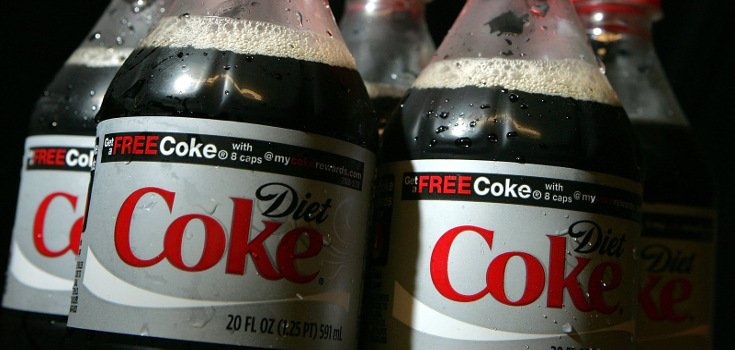Study: Drinking Diet Soda Leads to Weight GAIN

Do you still think that drinking diet soda will lead to weight loss? The popular weight loss beverage may have 0 calories, but research is continuously showing that the drink is a weak weight loss tool. In fact, a recent study has actually linked diet soda consumption with an increase in waistlines.
Published in the Journal of the American Geriatrics Society, the research examining the relationship between diet soda intake and waist circumference concluded:
“In a striking dose-response relationship, increasing DSI was associated with escalating abdominal obesity, a potential pathway for cardiometabolic risk in this aging population.”
The researchers looked at findings from a previous study of more than 700 white and Latino people, who were tracked for an average of about 9 years. The researchers found that those who didn’t drink diet sodas experienced a 0.8 increase in waistlines, while those who drank diet sodas occasionally saw a 1.8 inch increase. Regular diet soda drinkers saw a 3+ inch increase in waistlines.
So what’s the issue? It is often overweight individuals attempting to lose weight who are drinking diet soda, but could the correlation end there? There are a number of things to consider, one of which being that diet soda could actually cause you to eat more.
For example, a study conducted by researchers at the Johns Hopkins Bloomberg School of Public Health found that overweight and obese adults who drank diet beverages took in more food calories on average than those who drank regular sodas.
“Although overweight and obese adults who drink diet soda eat a comparable amount of total calories as heavier adults who drink sugary beverages, they consume significantly more calories from solid food at both meals and snacks,” lead study author Sara Bleich, associate professor in the Bloomberg School’s Department of Health Policy and Management, said in a press release.
But this is just comparing 2 evils. There are other factors at play here.
“We’re being naive if we only look at the number of calories in the label. People may be sabotaging their own health if they use diet sodas to protect themselves from gaining weight,” said study author Sharon Fowler, an adjunct assistant professor at the University of Texas Health Science Center at San Antonio.
While diet sodas don’t contain any calories (not necessarily a perfect factor for weight fluctuation, anyway), they do contain health-damaging artificial sweeteners that could be causing issues on multiple fronts. The artificial sweeteners such as aspartame added to diet soda make the drink questionable at best, and downright dangerous at worst.
Consumption of artificial sugar may lower immediate calorie intake, but when the tongue tastes sweetness and the body receives no calories from sugar, Purdue University says it gets confused. Consequently, people drinking diet soda may eat more food at meals and may even subconsciously go scavenging between meals. Appropriately, two or more cans of diet soda consumption was associated with a 500 percent increase in waistlines according to a University of Texas health Science Center study.
In other words, these artificial sweeteners mess with your brain in numerous ways – often even causing you to consume more than you normally would. But the damage doesn’t end there.
Diet sodas are very acidic, and the acidity or the artificial sweeteners may have a direct impact on things like gut microbes, which influence how we absorb nutrients.
Researchers from Purdue reviewed a dozen studies all published within the last five years on the health risks of consuming diet soda. It was in a piece in Trends in Endocrinology & Metabolism (pdf) where they revealed their “shock” over their findings.
The researchers wrote:
“The negative impact of consuming sugar-sweetened beverages on weight and other health outcomes has been increasingly recognized; therefore, many people have turned to high-intensity sweeteners like aspartame, sucralose, and saccharin as a way to reduce the risk of these consequences. However, accumulating evidence suggests that frequent consumers of these sugar substitutes may also be at increased risk of excessive weight gain, metabolic syndrome, type 2 diabetes, and cardiovascular disease.”
So, is diet soda bad for you? Study author Sharon Fowler says:
“Calorie free does not equal consequence free.”

I was over weight and tried so many things. Different things work for different people and I was lucky enough to find one that worked for me. I lost 18 pounds in one month without much exercise and it’s been a life changer. I’m a little embarrased to post my before and after photos here but if anyone actually cares to hear what I’ve been doing then I’d be happy to help in any way. Just shoot me an email at secretosdelara@gmail.com and I’ll show you my before and after photos, and tell you about how things are going for me with the stuff I’ve tried. I wish someone would have helped me out when I was struggling to find a solution so if I can help you then it would make my day
Congrats and keep up the good work!
Do the authors at “Natural Society” wonder whether or not readers here change their buying habits after reading these articles. Well this poster certainly has.
Thanks again for more great information.